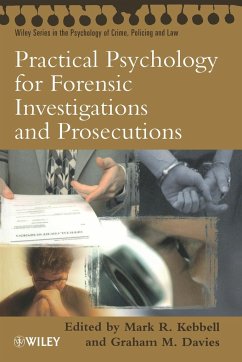Bridging the gap between other sources on the subject, Practical Psychology for Forensic Investigations begins with the interview of the victim of the crime, moving through the interviewing of suspects, to the decision to prosecute and enhancing the quality of evidence presented in court.
Despite important technological advances, most forensic investigations and prosecutions still rely heavily upon human factors. It is in understanding these human factors that psychology has a major role to play.
This book brings together cutting-edge researchers in forensic psychology to show how psychological knowledge can be applied to investigating and prosecuting offences. It takes a holistic approach, linking together the different stages of the investigation and prosecution processes, demonstrating what psychology can contribute at each stage. The links between maximising reporting rates, thorough investigation, proper presentation of evidence in court, and of effective sentencing policy are examined. Potential pitfalls for the investigative and prosecution process are outlined and ways of overcoming these problems discussed.
Practical Psychology for Forensic Investigations and Prosecutions describes contemporary research but it is also immensely practical. Written for police officers, lawyers, forensic psychologists and social workers, it will also be a valuable resource for all psychology students who wish to see how psychology can assist policing and the law
Despite important technological advances, most forensic investigations and prosecutions still rely heavily upon human factors. It is in understanding these human factors that psychology has a major role to play.
This book brings together cutting-edge researchers in forensic psychology to show how psychological knowledge can be applied to investigating and prosecuting offences. It takes a holistic approach, linking together the different stages of the investigation and prosecution processes, demonstrating what psychology can contribute at each stage. The links between maximising reporting rates, thorough investigation, proper presentation of evidence in court, and of effective sentencing policy are examined. Potential pitfalls for the investigative and prosecution process are outlined and ways of overcoming these problems discussed.
Practical Psychology for Forensic Investigations and Prosecutions describes contemporary research but it is also immensely practical. Written for police officers, lawyers, forensic psychologists and social workers, it will also be a valuable resource for all psychology students who wish to see how psychology can assist policing and the law
